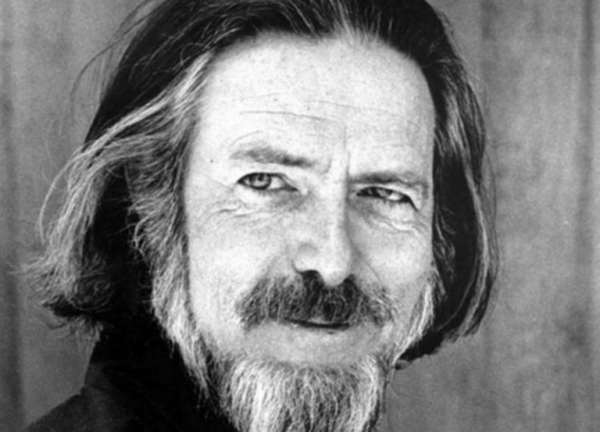Nine Alan Watts Quotes Worth Reflecting On


Written and verified by the psychologist Gema Sánchez Cuevas
Alan Watts quotes lead to deep reflection. They’ll shake up your understanding of the world, life, and relationships and give you a window into the fertile depths of being human.
Alan Watts (1915-1973) was a British writer and philosopher known for his interpretation of Eastern philosophy. He was also famous for his efforts in bringing it to the Western world.
He was strikingly lucid, ironic, and humorous. He wanted people to reflect on life and ask ourselves questions that could deconstruct our reality and break away from our frameworks.
Watts wrote over 25 books and many articles about things such as identity, happiness, consciousness, Zen, the nature of reality, and love in its broadest, deepest sense. Some of his best-known works are The Wisdom of Insecurity (1951), The Way of Zen (1957), and Tao: The Watercourse Way (1975), just to name a few.
In this article, we want to leave you with a small selection of the best Alan Watts quotes. They’re also a gift that can help you feel more alive and connected to reality.
Nine Amazing Alan Watts Quotes

The Thought Trap
“A person who thinks all the time has nothing to think about except thoughts. So, he loses touch with reality and lives in a world of illusions.“
We can either be masters or slaves of our thoughts. That depends on no one but ourselves. Thinking isn’t bad in and of itself, but it can become dangerous if you cling to it and get trapped in the vicious cycle of beliefs.
Being infallible, perfect, feeding into a single understanding of the world (and of the truth), firmly believing that other people can’t fail you and pushing them away if they do… These are just some examples of the most common ways that we distance ourselves from reality and feed our own suffering.
Thoughts are powerful, and you need to know how to use them properly. That means moderation, and knowing when to prune them if they try to grow into a place of confusion and self-deception. Alan Watts believed that the best way to manage them was to accept the present, to connect with who you are in the here and now.
The Limits of Words
“The poet is trying to describe what can’t be said. And he gets close, you know? He often really gives the illusion that he’s made it. And that’s a great thing, to be able to say what can’t be said. I am trying to express the mystical experience and it just can’t be done.”
Language is a social tool, something we invented to shape reality into a more understandable form. But it also makes reality hard to understand in some cases. The richness of language allows us to describe some amazing things, but it has its limits. What’s been said or written isn’t always enough to truly express what we feel, or see around us.
The problem is when you accept that language has limits and assume you can’t go any farther. That would be like being short-sighted towards the world of the senses, of experiences. It would mean living half as much as we truly can, or maybe less. That’s why Alan Watts took such an interest in the topic of language.
The Secret to Life’s Path
“When we dance, the journey itself is the point, as when we play music the playing itself is the point. And exactly the same thing is true in meditation. Meditation is the discovery that the point of life is always arrived at in the immediate moment.”
This Alan Watts quote can bear some wonderful fruit if you plant it in your mind. Enjoying the path of life is much more enriching than reaching any kind of goal. The experience of each individual moment, building a connection with the present… this makes you aware of reality.
Some of us have the bad habit of obsessing over the end of something. We want to taste victory without having to worry about the path to get there. This has a negative side you might not have thought of, too. If you haven’t paid attention to the path towards your goal, you won’t be aware of all the effort you’ve put in, either.

The Importance of the Present
“If, then, my awareness of the past and future makes me less aware of the present, I must begin to wonder whether I’m actually living in the real world.”
The present is a recurring theme in history, and not its main focus. This is why we can’t just let it pass us by. When people with completely different ideologies are all talking about one thing, it’s probably something worth paying attention to. That should make it one of the subjects on your to-do-list.
We’re in a maze that connects the past and future without realizing that we have the key to the way out: the present. We do a good job of telling ourselves stories full of fear, worry, and guilt. We walk around exhausted, with our heads down thinking about what once was, and what will be. But you can only experience the reality of your life if you focus on the present.
The Value of Detachment
“Detachment means to have neither regrets for the past nor fears for the future; to let life take its course without attempting to interfere with its movement and change, neither trying to prolong the stay of things pleasant nor to hasten the departure of things unpleasant.“
Clinging onto things, situations, and people is like building walls that keep life from flowing. All you get instead is suffering. You’re feeding into concepts of belonging, control, and power. What that does is push you away from your true essence and keep you stuck in the material world, in the pleasure-displeasure dynamic.
This quote shows the influence Eastern philosophy had on Alan Watts. You should drop the idea that things and people belong to you. Otherwise, you’ll just turn into a victim of fear and loss, and that only leads to more and more suffering.
Knowing how to give things up is the key to getting away from the traps of expectation and desire. Once you’ve done that, it’s much easier to reach a state of fulfillment and harmony.
The Value of Impermanence
“The more a thing tends to be permanent, the more it tends to be lifeless.”
This is another one of our favorite Alan Watts quotes, and it’s worth carving into your mind. Impermanence is the law of transience. It’s the law that says nothing remains because everything is constantly changing. Things might seem the same as they did yesterday, but there’s always a difference, whether inside or outside of you.
Accepting impermanence and making it part of your life philosophy is the first step to getting away from the traps of desire, ego, ignorance, and unchecked passion for sensory experiences. Here’s another Alan Watts quote that explains it in a different way:
“The greater part of human activity is designed to make permanent those experiences and joys which are only lovable because they’re changing.”

The Senselessness of Safety
“What we have to discover is that there’s no safety, that seeking is painful, and that when we imagine that we have found it, we don’t like it.”
We hate uncertainty and not being in control. But what you don’t realize or sometimes just ignore is that there’s nothing safe in life. Everything we believe brings with it a certain degree of illusion. Once you start to believe in safety, you’re opening yourself up to suffering and getting caught in the web of fears and needs.
A lot of Alan Watts’ quotes in The Wisdom of Insecurity are reflections on this. He also said: “If to enjoy even an enjoyable present we must have the assurance of a happy future, we are ‘crying for the moon.”” Why? Because, as we said above, it’s impossible to be certain about anything. What that does is open the door for you to enjoy uncertainty.
It’s impossible to avoid pain, disappointment, and suffering in life. Trying to protect yourself behind safety is nothing more than an illusion. It’s a short-term solution that only creates problems in the long-run. The more safety you seek out, the more you’ll suffer. Nothing is static, everything changes. In other words: nothing can stay the same forever.
The Concept of Interdependence
“For every individual is a unique manifestation of the Whole, as every branch is a particular outreaching of the tree.”
This quote has a strong connection to Buddhist philosophy and one of its most fundamental concepts: interdependence. According to this religion, all the elements in the world depend on another. In other words, things depend on one another for reasons that are in constant flux, always interacting with each other.
That also means they’re empty within. The fact that things exist in some way, and that we can interact with them, just means that they’re essentially nonexistent.
This might be hard to grasp at first because it’s saying that change and interaction are the basic conditions for our awareness of existence. It’s by accepting this duality and separating things that you start to believe in individual identity. That’s what makes suffering possible in our lives.
As you can see, Alan Watts’ quotes are a wonderful tool for reflection and awakening your consciousness. They can help you broaden your mental and visual understanding of the world. They’re also little nuggets of wisdom that you should always keep in mind on your journey to personal growth.
Before we go, we want to leave you with a video of one of Alan Watts’ most famous lectures. It’s about the spectrum of love. We’re sure you’ll love it!
Alan Watts quotes lead to deep reflection. They’ll shake up your understanding of the world, life, and relationships and give you a window into the fertile depths of being human.
Alan Watts (1915-1973) was a British writer and philosopher known for his interpretation of Eastern philosophy. He was also famous for his efforts in bringing it to the Western world.
He was strikingly lucid, ironic, and humorous. He wanted people to reflect on life and ask ourselves questions that could deconstruct our reality and break away from our frameworks.
Watts wrote over 25 books and many articles about things such as identity, happiness, consciousness, Zen, the nature of reality, and love in its broadest, deepest sense. Some of his best-known works are The Wisdom of Insecurity (1951), The Way of Zen (1957), and Tao: The Watercourse Way (1975), just to name a few.
In this article, we want to leave you with a small selection of the best Alan Watts quotes. They’re also a gift that can help you feel more alive and connected to reality.
Nine Amazing Alan Watts Quotes

The Thought Trap
“A person who thinks all the time has nothing to think about except thoughts. So, he loses touch with reality and lives in a world of illusions.“
We can either be masters or slaves of our thoughts. That depends on no one but ourselves. Thinking isn’t bad in and of itself, but it can become dangerous if you cling to it and get trapped in the vicious cycle of beliefs.
Being infallible, perfect, feeding into a single understanding of the world (and of the truth), firmly believing that other people can’t fail you and pushing them away if they do… These are just some examples of the most common ways that we distance ourselves from reality and feed our own suffering.
Thoughts are powerful, and you need to know how to use them properly. That means moderation, and knowing when to prune them if they try to grow into a place of confusion and self-deception. Alan Watts believed that the best way to manage them was to accept the present, to connect with who you are in the here and now.
The Limits of Words
“The poet is trying to describe what can’t be said. And he gets close, you know? He often really gives the illusion that he’s made it. And that’s a great thing, to be able to say what can’t be said. I am trying to express the mystical experience and it just can’t be done.”
Language is a social tool, something we invented to shape reality into a more understandable form. But it also makes reality hard to understand in some cases. The richness of language allows us to describe some amazing things, but it has its limits. What’s been said or written isn’t always enough to truly express what we feel, or see around us.
The problem is when you accept that language has limits and assume you can’t go any farther. That would be like being short-sighted towards the world of the senses, of experiences. It would mean living half as much as we truly can, or maybe less. That’s why Alan Watts took such an interest in the topic of language.
The Secret to Life’s Path
“When we dance, the journey itself is the point, as when we play music the playing itself is the point. And exactly the same thing is true in meditation. Meditation is the discovery that the point of life is always arrived at in the immediate moment.”
This Alan Watts quote can bear some wonderful fruit if you plant it in your mind. Enjoying the path of life is much more enriching than reaching any kind of goal. The experience of each individual moment, building a connection with the present… this makes you aware of reality.
Some of us have the bad habit of obsessing over the end of something. We want to taste victory without having to worry about the path to get there. This has a negative side you might not have thought of, too. If you haven’t paid attention to the path towards your goal, you won’t be aware of all the effort you’ve put in, either.

The Importance of the Present
“If, then, my awareness of the past and future makes me less aware of the present, I must begin to wonder whether I’m actually living in the real world.”
The present is a recurring theme in history, and not its main focus. This is why we can’t just let it pass us by. When people with completely different ideologies are all talking about one thing, it’s probably something worth paying attention to. That should make it one of the subjects on your to-do-list.
We’re in a maze that connects the past and future without realizing that we have the key to the way out: the present. We do a good job of telling ourselves stories full of fear, worry, and guilt. We walk around exhausted, with our heads down thinking about what once was, and what will be. But you can only experience the reality of your life if you focus on the present.
The Value of Detachment
“Detachment means to have neither regrets for the past nor fears for the future; to let life take its course without attempting to interfere with its movement and change, neither trying to prolong the stay of things pleasant nor to hasten the departure of things unpleasant.“
Clinging onto things, situations, and people is like building walls that keep life from flowing. All you get instead is suffering. You’re feeding into concepts of belonging, control, and power. What that does is push you away from your true essence and keep you stuck in the material world, in the pleasure-displeasure dynamic.
This quote shows the influence Eastern philosophy had on Alan Watts. You should drop the idea that things and people belong to you. Otherwise, you’ll just turn into a victim of fear and loss, and that only leads to more and more suffering.
Knowing how to give things up is the key to getting away from the traps of expectation and desire. Once you’ve done that, it’s much easier to reach a state of fulfillment and harmony.
The Value of Impermanence
“The more a thing tends to be permanent, the more it tends to be lifeless.”
This is another one of our favorite Alan Watts quotes, and it’s worth carving into your mind. Impermanence is the law of transience. It’s the law that says nothing remains because everything is constantly changing. Things might seem the same as they did yesterday, but there’s always a difference, whether inside or outside of you.
Accepting impermanence and making it part of your life philosophy is the first step to getting away from the traps of desire, ego, ignorance, and unchecked passion for sensory experiences. Here’s another Alan Watts quote that explains it in a different way:
“The greater part of human activity is designed to make permanent those experiences and joys which are only lovable because they’re changing.”

The Senselessness of Safety
“What we have to discover is that there’s no safety, that seeking is painful, and that when we imagine that we have found it, we don’t like it.”
We hate uncertainty and not being in control. But what you don’t realize or sometimes just ignore is that there’s nothing safe in life. Everything we believe brings with it a certain degree of illusion. Once you start to believe in safety, you’re opening yourself up to suffering and getting caught in the web of fears and needs.
A lot of Alan Watts’ quotes in The Wisdom of Insecurity are reflections on this. He also said: “If to enjoy even an enjoyable present we must have the assurance of a happy future, we are ‘crying for the moon.”” Why? Because, as we said above, it’s impossible to be certain about anything. What that does is open the door for you to enjoy uncertainty.
It’s impossible to avoid pain, disappointment, and suffering in life. Trying to protect yourself behind safety is nothing more than an illusion. It’s a short-term solution that only creates problems in the long-run. The more safety you seek out, the more you’ll suffer. Nothing is static, everything changes. In other words: nothing can stay the same forever.
The Concept of Interdependence
“For every individual is a unique manifestation of the Whole, as every branch is a particular outreaching of the tree.”
This quote has a strong connection to Buddhist philosophy and one of its most fundamental concepts: interdependence. According to this religion, all the elements in the world depend on another. In other words, things depend on one another for reasons that are in constant flux, always interacting with each other.
That also means they’re empty within. The fact that things exist in some way, and that we can interact with them, just means that they’re essentially nonexistent.
This might be hard to grasp at first because it’s saying that change and interaction are the basic conditions for our awareness of existence. It’s by accepting this duality and separating things that you start to believe in individual identity. That’s what makes suffering possible in our lives.
As you can see, Alan Watts’ quotes are a wonderful tool for reflection and awakening your consciousness. They can help you broaden your mental and visual understanding of the world. They’re also little nuggets of wisdom that you should always keep in mind on your journey to personal growth.
Before we go, we want to leave you with a video of one of Alan Watts’ most famous lectures. It’s about the spectrum of love. We’re sure you’ll love it!
This text is provided for informational purposes only and does not replace consultation with a professional. If in doubt, consult your specialist.







